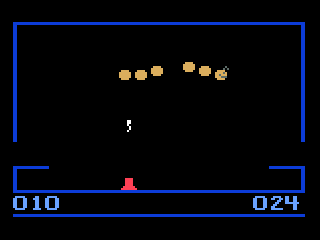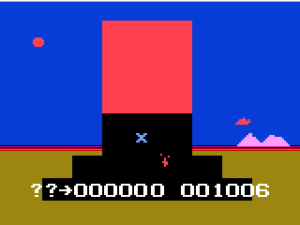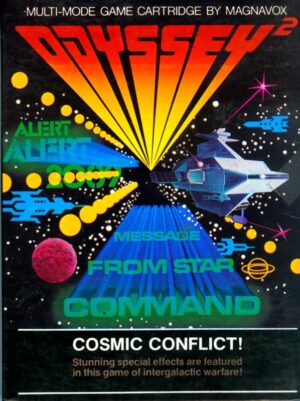Retro Replay Review
Gameplay
Sid the Spellbinder! merges classic arcade shooting with an educational twist, creating an experience that feels both familiar and refreshingly novel. Players face off against a giant segmented snake—Sid—whose movements echo the patterns of Space Invaders but with a serpentine flare. Armed with a finite supply of missiles, you must target and destroy Sid’s individual segments before they slither into the lower screen openings. Precision and timing are critical; missing a segment or firing too hastily can quickly deplete your limited arsenal.
(HEY YOU!! We hope you enjoy! We try not to run ads. So basically, this is a very expensive hobby running this site. Please consider joining us for updates, forums, and more. Network w/ us to make some cash or friends while retro gaming, and you can win some free retro games for posting. Okay, carry on 👍)
The scoring system in Sid the Spellbinder! adds an extra layer of strategy. Every segment you hit awards points in an increasing sequence—one point for the first segment, two for the second, all the way up to ten. If your total remains below 200, Sid will regroup its segments offscreen, forming a solid target on his return. Surpass 200 points, however, and Sid returns trailing gaps in his coils, forcing you to adapt your aim and take riskier shots. This dynamic keeps each stage engaging, as the game’s difficulty subtly evolves based on your performance.
Once Sid either breaches your defenses or is entirely vanquished, the action shifts dramatically into a spelling challenge. The Voice add-on announces three words aloud, and you type each word correctly to earn valuable missile replenishments—ten missiles per correct word on the standard skill level (five on level two). You have two attempts per word, encouraging both listening skills and careful typing. This blend of shooter and educational gameplay makes Sid the Spellbinder! a hybrid that appeals to fans of arcade action and those seeking a brainy twist.
Graphics
Graphically, Sid the Spellbinder! draws upon the Atari 2600’s palette to deliver simple but effective visuals. The playfield is clear and uncluttered: Sid’s segmented body is rendered in solid contrasting colors that stand out against the dark, starry backdrop. Each segment is distinctly shaped, making targets easy to identify even during fast-paced moments. The straightforward design ensures that gameplay remains the focus.
Animation is smooth for its era, with Sid slithering down the screen in a fluid motion that enhances the sense of an organic threat. When Sid leaves and re-enters the field, the reassembly or gapped formation is visually intuitive—players can immediately see how many segments remain and where to concentrate their fire. Explosions are represented by brief flickers or small blocky bursts, signaling a successful hit without distracting from the core action.
While there’s no elaborate background art or parallax scrolling, the minimalism suits the game’s dual nature. The simplicity ensures that both the shooting segments and the spelling prompts (displayed centrally during the word-play phase) remain clear and legible. Combined with The Voice synthesizer’s vocal announcements, the graphics create a cohesive aesthetic that’s functional, retro-charming, and perfectly in service of the gameplay.
Story
Sid the Spellbinder! doesn’t feature a sprawling narrative or character arcs; instead, it presents an abstract premise that frames its two core modes. The titular Sid is a cosmic serpent threatening to breach your missile bunkers, and your mission is to stop him. Once the shooting phase concludes, the serpent’s “spell” transforms into spoken words you must decipher and type correctly. This minimalist storyline hinges on the playful concept of “spellbinding” in both the literal and magical senses.
The sparse narrative leaves much to the player’s imagination, but that freedom can be a strength. You might envision yourself as a space-age ranger repelling an otherworldly snake, or as a tower-defense apprentice whose greatest magic is precise spelling. The lack of rigid plot details means each session feels open to interpretation, allowing the arcade action and wordplay to become your personal saga.
Moreover, the inclusion of The Voice add-on deepens the thematic link between “spell” and “spelling.” Hearing words aloud in real time underscores the notion that language itself holds power—miss a spelling, and your missile reserves dwindle. Though the story framework is minimal, this clever metaphor keeps the experience thematically cohesive from start to finish.
Overall Experience
Sid the Spellbinder! stands out as a creative hybrid of arcade shooting and educational gameplay. The initial thrill of blasting down a giant snake merges seamlessly with the brain-teasing challenge of spelling under pressure. It’s a formula that remains entertaining over multiple sessions, thanks to the dynamic scoring mechanics and the tangible reward of missile replenishments for correct answers.
The game’s simplicity is part of its charm, though it may feel brief by modern standards. Yet, each playthrough offers just enough variation—through score-based segment alignment and randomized word lists—to keep you coming back. The Voice integration elevates the experience, transforming simple on-screen text into an interactive audio quiz that feels surprisingly immersive for its time.
For collectors and retro-gaming enthusiasts, Sid the Spellbinder! offers both nostalgic arcade action and a quirky educational twist. While it lacks the depth of contemporary titles, its seamless blend of shooter and spelling quiz makes it a unique and memorable gem from the era of Atari experimentation. If you’re looking for a quick-fire challenge that rewards both sharp reflexes and sharp minds, this title delivers in spades.
 Retro Replay Retro Replay gaming reviews, news, emulation, geek stuff and more!
Retro Replay Retro Replay gaming reviews, news, emulation, geek stuff and more!








Reviews
There are no reviews yet.